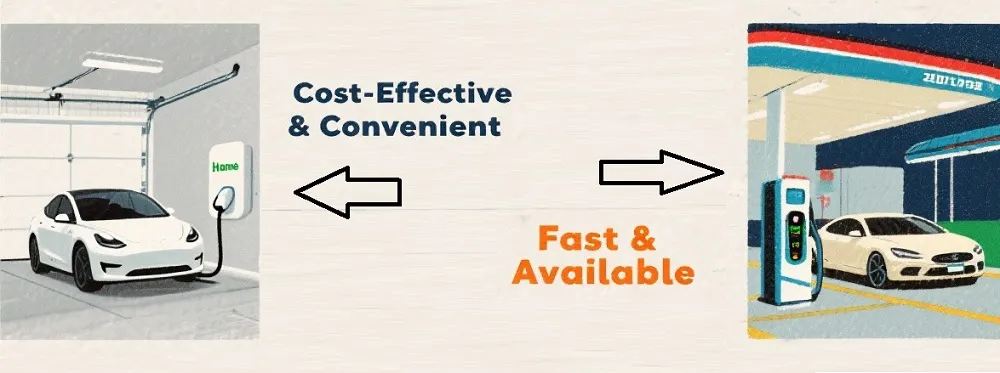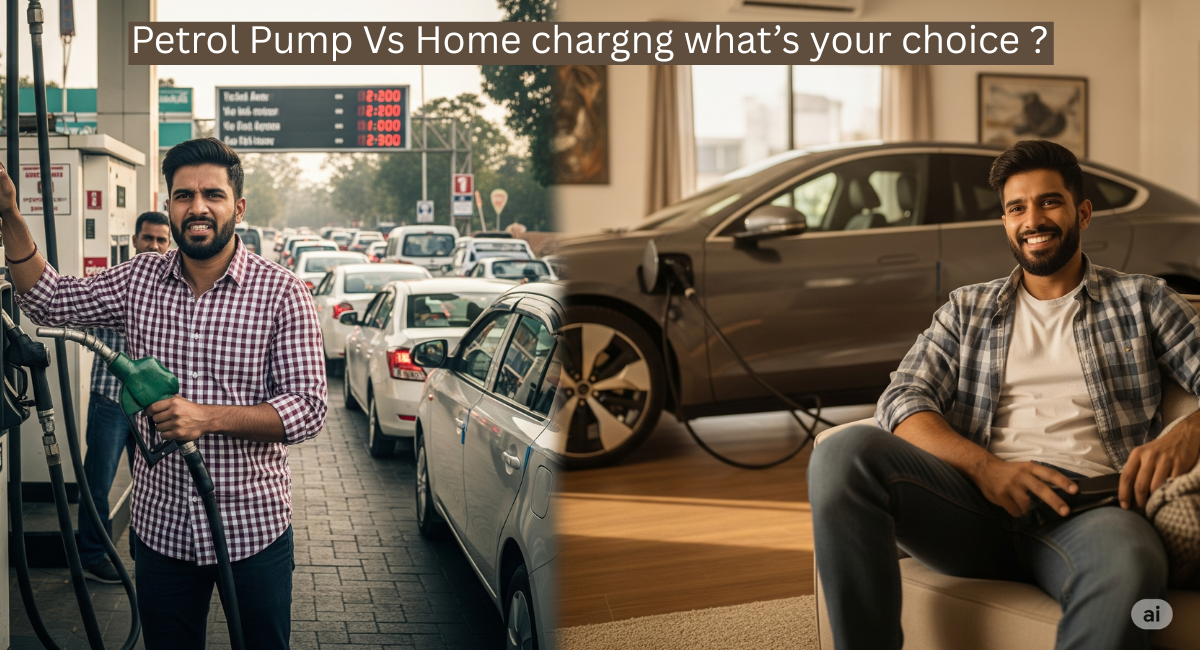In 2025, with petrol prices reaching sky-high levels, many people in India are seriously thinking about EV car charging cost and whether switching to an electric vehicle really saves money.
But is it really that simple? Let’s break it all down and find out how much it really costs to charge an electric car in India in 2025—at home and at public charging stations.
Understanding Electric Vehicle Charging Rates:
Think of charging your electric car like charging your phone—but way bigger. The cost to charge electric car per kWh depends on where and when you plug in, just like how your phone charger uses different amounts of power.
Here’s how it works:
- Your electric car has a battery
- You plug it into a charger
- Electricity fills up the battery
- You pay for the electricity, usually per unit (kWh)
3 Common Ways to Charge:
- Home Charging – Cheapest and most convenient
- Office Charging – Often free or low-cost
- Public Charging Stations – More expensive, but fast and accessible
Electric vehicle charging rates vary a lot across India. In Delhi, charging at home may cost just ₹4 per unit, but at a highway fast charger, it could go up to ₹20 per unit. Think of it like cooking at home versus eating out—it’s all about convenience and cost.
Home EV Charging: Your Biggest Money Saver
Setting up a home EV charger installation cost might sound scary at first, but it’s actually like buying a good pressure cooker—you spend money once and save every day after that.
Home Charger Cost in India:
Basic 3kW charger: ₹15,000–₹25,000 (including installation)
Why Home Charging Wins Every Time:
- Cheapest rates (₹3–₹6 per kWh)
- No queues, no stress – Your personal charging station
- Charge overnight while you sleep peacefully
- Special night rates – Some states offer cheaper electricity at night
Average Monthly Charging Cost for 1000 km:
| City | Home Rate (₹/kWh) | Cost for 1000 km |
| Delhi | ₹4.50 | ₹1,350 |
| Mumbai | ₹3.80 | ₹1,140 |
| Bengaluru | ₹5.20 | ₹1,560 |
| Chennai | ₹4.10 | ₹1,230 |
Tip: Use smart charger it automatically charges your car at night when electricity is cheapest. You can save an extra ₹500 every month compared to regular charging!
Let’s Do Simple Math:
If your car uses 30 kWh for 100 km, and you pay ₹4 per unit:
- 30 × ₹4 = ₹120 per 100 km
- Compare to petrol: 100 km ÷ 15 km/liter = 6.6 liters × ₹100 = ₹667!
That’s a huge difference in your EV car charging cost versus petrol expenses.
Public EV Charging Station Prices:
EV charging station prices are higher than home charging, but they’re still often cheaper than filling up with petrol.
Types of Public Charging & Prices:
| Type | Speed | Cost per kWh |
| Slow Charging | 3–7 kW | ₹8–₹12 |
| Fast Charging | 25–50 kW | ₹12–₹18 |
| Ultra-fast Charging | 150+ kW | ₹15–₹25 |
Top Charging Networks & Their Rates:
- Tata Power: ₹12–₹16 per kWh
- Ather Grid: ₹10–₹14 per kWh
- Shell Recharge: ₹15–₹20 per kWh
- ChargeZone: ₹8–₹15 per kWh
Money-Saving Tips for Public Charging:
- Use apps to find the cheapest stations nearby
- Charge during off-peak hours when possible
- Join membership programs for 10–20% discounts
- Plan your route to avoid emergency fast charging
The key is understanding that EV car charging cost at public stations is still much lower than petrol for most trips.
EV Running Cost Per Kilometer:
This is the real number that affects your monthly budget. EV running cost per kilometer includes everything—electricity, maintenance, insurance, and more.
EV Running Cost in India:
| EV Model | Cost per KM (₹) |
| Tata Nexon EV | ₹1.20–₹1.80 |
| MG ZS EV | ₹1.50–₹2.20 |
| Hyundai Kona | ₹1.40–₹2.10 |
| BYD Atto 3 | ₹1.30–₹1.90 |
Petrol Car Cost per KM:
| Petrol Car | Cost per KM (₹) |
| Maruti Swift | ₹4.50–₹5.50 |
| Hyundai i20 | ₹5.00–₹6.00 |
| Honda City | ₹5.20–₹6.20 |
What Affects Your EV car charging cost Per KM?
- Your driving style – Smooth driving uses less energy
- Traffic and roads – City versus highway driving
- Battery health – Well-maintained EV batteries work better
- Weather – Extreme heat or cold affects efficiency
- Car maintenance – Regular checkups keep costs low
Hidden Savings You Might Miss:
- No oil changes = Save ₹3,000–₹5,000 every year
- Fewer brake replacements thanks to regenerative braking
- Lower insurance premiums in many cases
- Government subsidies and tax benefits

Home vs Public Charging: Which Saves More Money?
Choose between home and public charging —both have their place, but one is clearly cheaper for daily use.
Home Charging Benefits:
- Cost: 60-70% cheaper than public charging
- Convenience: No waiting, no driving to stations
- Reliability: Always available when you need it
- Time: Charge overnight while you sleep
Public Charging Benefits:
- Speed: Fast charging for long trips
- No setup cost: No installation needed
- Flexibility: Charge anywhere you travel
- Emergency backup: When home charging isn’t possible
The Smart Strategy: Use home charging for 80-90% of your needs, and public charging for long road trips or emergencies.
When Does It Pay Off? If home charging saves you ₹4,000 monthly compared to petrol, your ₹20,000 installation pays for itself in just 5 months!
Is EV Charging Really Cheaper Than Petrol?
YES—and it’s not even close.
Let’s look at the real numbers for a typical Indian family:
Monthly Comparison (1,500 km driving):
Electric Car (Tata Nexon EV):
- Charging cost: ₹2,250
- Maintenance: ₹800
- Insurance: ₹1,200
- Total: ₹4,250
Petrol Car (Similar size):
- Fuel cost: ₹9,000
- Maintenance: ₹2,500
- Insurance: ₹1,500
- Total: ₹13,000
Monthly savings: ₹8,750
Yearly savings: ₹1,05,000
But there’s better news:
- Road tax: Many states give 50-100% subsidies for electric cars
- Parking: Free parking at many malls and offices
- Tolls: Some highways offer discounts for electric vehicles
- Registration: Lower fees when you buy an electric car
5-Year Total Cost:
- Electric car: ₹2,55,000 (charging + maintenance)
- Petrol car: ₹7,80,000 (fuel + maintenance)
- Your total savings: ₹5,25,000
The truth is simple: EV charging cost is much, much lower than petrol expenses for most Indian families. Yes, electric cars cost more to buy, but government subsidies help, and your monthly savings quickly make up the difference.
Whether you’re tired of high petrol bills or want to save money for your family’s future, electric cars offer real, proven savings. The technology works, charging stations are everywhere, and the money you save is real.
Ready to start saving? Track your current petrol expenses this month, then use an online calculator to see how much you could save with an electric car. The numbers might surprise you—and your wallet will definitely thank you!

